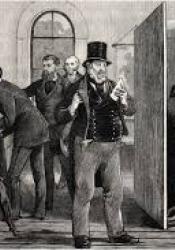Universal Manhood Suffrage Bill
Universal manhood suffrage was introduced in Parliament instead of the Conciliation bill giving women the right to vote in 1911. This bill would allow all men to vote to remove the prior restrictions such as being required to be a landowner. Parliament and the Prime Minister at this time H.H. Asquith’s decision to favor this bill and not the conciliation bill made many people angry. Suffragettes were the most outspoken in opposition to this bill as they were working to get women who owned property the right to vote and were rejected in favor of manhood suffrage. This was viewed as a betrayal to the suffragettes because H.H. Asquith said while running for re-election as Prime Minister that he would facilitate a Conciliation bill that gives women the right to vote in Parliament. H.H. Asquith after announcing the universal manhood suffrage bill said he still would facilitate a conciliation bill, but it did not pacify the suffragettes.
The article “The Englishwoman: Militancy and the Reform Bill” talks about the universal manhood suffrage bill on page 242 and describes the bill and the trouble associated with the bill. The suffragettes saw as well as many other people that with this bill being passed it was unlikely that a Conciliation bill would be passed. The newspaper article “Great Britain. At this crucial period in the fight for Woman's Suffrage” shows the early stages in getting the universal manhood suffrage bill passed. This article shows that the Labor party was not in favor of the universal manhood suffrage bill and talks about the Women’s Social and Political Union’s involvement. The article “The Women’s Suffrage Movement in England” on page 606 gives a more detailed look at when the bill was introduced and the reaction from suffragettes to the bill as well as the attitude about H.H. Asquith after the introduction of the bill.
Great Britain. At this crucial period in the fight for Woman's Suffrage
The Secretary of the W S P
The Englishwoman: Militancy and the Reform Bill
P Whitwell
The Women's Suffrage Movement in England
https://www.jstor.org/stable/pdf/1944309.pdf
Dilke, Emilia F. S. “Woman Suffrage in England.” The North American Review, vol. 164, no. 483, 1897, pp. 151–159. JSTOR, JSTOR, www.jstor.org/stable/25150939.

